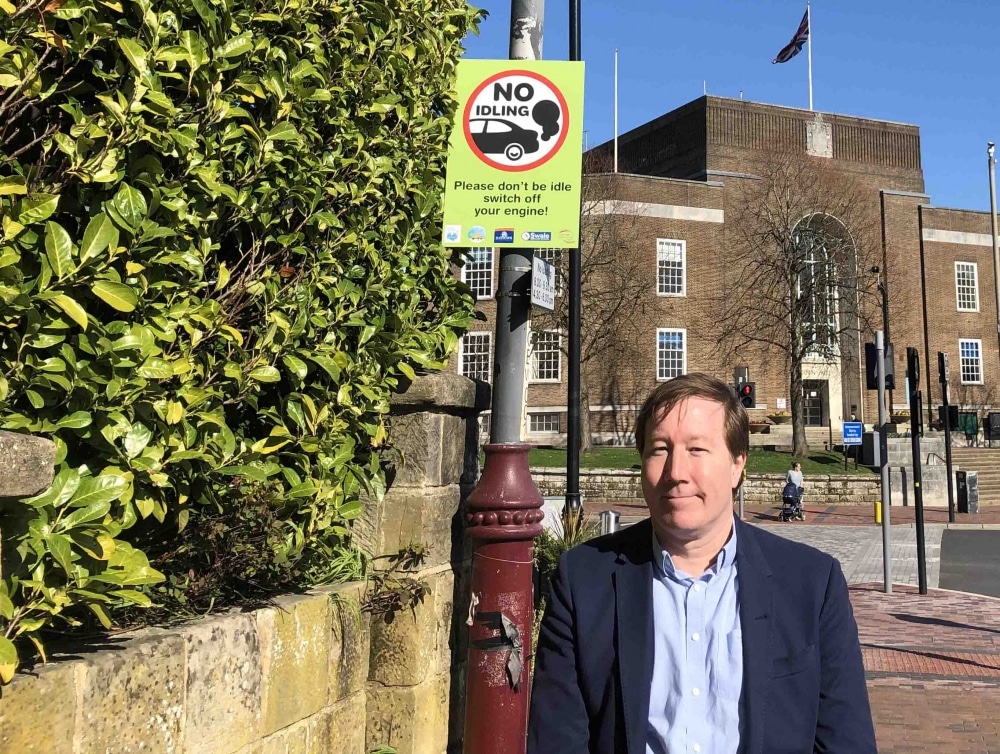As reported in the Times earlier this year, Tunbridge Wells Borough Council [TWBC] wants to change the habits of motorists in a bid to improve air quality by banning the idling of engines when cars are stationary. Those who ignored the request, it was indicated, faced possible fines.
A number of signs have gone up on busy intersections reminding drivers to turn off their motors when they are not moving.
It had been hoped that Littering or Parking Enforcement Officers could urge drivers to turn off their engines with the threat of a Fixed Penalty Notice [FPN].
The Highway Code states that leaving ‘a vehicle’s engine running unnecessarily while that vehicle is stationary on a public road’ can incur ‘a £20 fixed-penalty fine under the Road Traffic (Vehicle Emissions) Regulations 2002’.
But in a U-turn, the Council has had to drop plans to hand drivers £20 FPNs as it would cost more to issue the tickets than the authority would receive back in fines.
At the Council’s Planning and Transport Advisory Board on Monday [July 12] councillors were asked to back the six-month trial.
The committee heard how the scheme will use ‘existing Littering Enforcement Officers to approach drivers who are stationary with their engines idling’.
These officers will then ‘advise drivers of the illegality of their behaviour and its impact on the environment’.
They would ask the driver to turn off their engine, but the report states: “In the event a driver refuses, no enforcement action, through the issue of a FPN would take place.”
The report sent to the committee highlighted significant ‘operational and financial implications’ in attempting to fine drivers.
It said that along with enforcement staff, administrative staff would be required to manage appeals and debt collection.
A new software module would also be needed to process the tickets, which would carry associated consultancy and maintenance costs, as well as costs to print the PCNs.
In addition, the Council would have to factor in the cost of registration of cases at the County Court and potential legal representation to deal with appeals through the court system.
The Council also says that while a driver can be fined £20 for idling, he or she would not be committing an offence if ‘the necessities of traffic’ made it not possible to turn the engine off, which makes fines ‘a rare outcome’.
The report went on: “A budget would need to be allocated as this work could not be accommodated within existing budgets.
“Even if there are high levels of non-compliance and refusals to turn idling engines off, the statutory FPN level of £20 will not make any significant contribution towards the costs of carrying out this work.”
Instead, compliance by drivers being asked to turn off their engines will be recorded and reviewed after six months.
Matt Bailey, the councillor in charge of sustainability, said: “The Council’s policy is to raise awareness about unnecessary idling and try to change behaviour that way.
“The reason we’re doing this is because of the dangers of air pollution, with the Royal College of Physicians saying it accounts for up to 40,000 deaths every year.
“Air pollution also harms the health and development of children as well as affecting the elderly and those with existing health conditions, such as asthma.
“The Council is looking at various ways to raise awareness, particularly in target areas such as town centres and around schools.”
BOROUGH MAKES THE TOP TEN FOR VEHICLE NOISE COMPLAINTS
Tunbridge Wells has the tenth highest number of complaints about traffic noise of any town or city, a Freedom of Information request has revealed.
The research, from comparethemarket.com, asked councils about how many vehicle noise complaints they received in a year.
The insurance website contacted all 381 local councils around the country to request the total number of vehicle noise complaints received in the 2020 calendar year.
Of the 288 councils that replied, Tunbridge Wells Borough Council had the tenth highest number, with 81 complaints.
These refer to a wide range of issues, including traffic noise and engine revving, but also car alarms, noise from delivery vehicles, loud music from cars, and more.
The highest number of complaints about traffic noise were made to County Durham Council, which received 162.
The South East and West Midlands rank as the regions with the noisiest areas outside of London. They both hold five areas each with the most amount of vehicle related noise complaints.








